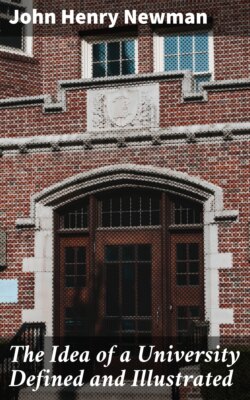Читать книгу The Idea of a University Defined and Illustrated - John Henry Newman - Страница 39
На сайте Литреса книга снята с продажи.
4.
ОглавлениеTable of Contents
Now, observe how this impatience acts in matters of research and speculation. What happens to the ignorant and hotheaded, will take place in the case of every person whose education or pursuits are contracted, whether they be merely professional, merely scientific, or of whatever other peculiar complexion. Men, whose life lies in the cultivation of one science, or the exercise of one method of thought, have no more right, though they have often more ambition, to generalize upon the basis of their own pursuit but beyond its range, than the schoolboy or the ploughman to judge of a Prime Minister. But they must have something to say on every subject; habit, fashion, the public require it of them: and, if so, they can only give sentence according to their knowledge. You might think this ought to make such a person modest in his enunciations; not so: too often it happens that, in proportion to the narrowness of his knowledge, is, not his distrust of it, but the deep hold it has upon him, his absolute conviction of his own conclusions, and his positiveness in [pg 077] maintaining them. He has the obstinacy of the bigot, whom he scorns, without the bigot's apology, that he has been taught, as he thinks, his doctrine from heaven. Thus he becomes, what is commonly called, a man of one idea; which properly means a man of one science, and of the view, partly true, but subordinate, partly false, which is all that can proceed out of any thing so partial. Hence it is that we have the principles of utility, of combination, of progress, of philanthropy, or, in material sciences, comparative anatomy, phrenology, electricity, exalted into leading ideas, and keys, if not of all knowledge, at least of many things more than belong to them,—principles, all of them true to a certain point, yet all degenerating into error and quackery, because they are carried to excess, viz. at the point where they require interpretation and restraint from other quarters, and because they are employed to do what is simply too much for them, inasmuch as a little science is not deep philosophy.
Lord Bacon has set down the abuse, of which I am speaking, among the impediments to the Advancement of the Sciences, when he observes that “men have used to infect their meditations, opinions, and doctrines, with some conceits which they have most admired, or some Sciences which they have most applied; and give all things else a tincture according to them utterly untrue and improper.…” So have the alchemists made a philosophy out of a few experiments of the furnace; and Gilbertus, our countryman, hath made a philosophy out of the observations of a lodestone. So Cicero, when, reciting the several opinions of the nature of the soul, he found a musician that held the soul was but a harmony, saith pleasantly, “hic ab arte suâ non recessit,” “he was true to his art.” But of these conceits Aristotle speaketh [pg 078] seriously and wisely when he saith, “Qui respiciunt ad pauca, de facili pronunciant,” “they who contemplate a few things have no difficulty in deciding.”
